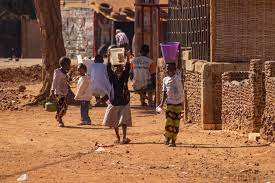Aji Fatou Jammeh
In The Gambia, child labor is one of the most significant factors that keep children away from school; thus taking away their right to education. Contrary to what is supposed to be the norm, children in most homes tend to take part in supporting the family, financially. From participating in petty trading to begging on the streets, at the end of the day, these children are expected to return home with a certain amount of money.
Aside from being deprived of education, these children are also exposed to dangers of trafficking, kidnapping and rape.
Mariama Cham, a child rights activist and social worker described child labor as any activity that deprives children from their right to education and also affects them mentally, psychologically and physically.
She stressed that child labor has the potential of depriving children from getting quality education as their level of education gets lesser as they engage more in selling.
Ms Cham opined that supporting one’s parents to earn income is normal, saying “this is something most of us passed through, but it should not stop one from going to school’’. She argued that parents are not supposed to include their children in activities that might deprive them from being educated.
“The law stated that any child below 16 shall be protected from economic exploitation and shall not be employed or required to perform work that is hazardous or interfere with their education,’’ she quoted.
Ms Cham said sending children to sell on the streets exposes them to dangers such as trafficking, harassment or sexual assaults. She pointed out that accidents too could be a threat as they go around busy streets.
She believes that the government, parents and care givers have huge roles to play in protecting children. While parents are responsible for keeping their children away from activities that might harm them, the authorities are expected to implement laws that would help eradicate the act.
“I am advocating for the government to put mechanisms and measures to make sure parents are aware of the laws and the risk factors associated with child labor so that at the end of the day, we won’t see any child selling around the market,’’ she said.
She also called on the relevant stakeholders to continue the advocacy work by sensitizing parents on child labor and come up with strategic plans to end the menace.
Ms. Cham believes that the state should enforce the provision of the Children’s Act 2005 and the Labor Act 2007 which prohibits child labor or the engagement of children in activities which are exploitative, hazardous or not in the best interest of the child.
She said child labor should be everyone’s business and people should refrain from saying ‘’he/she is not my child’’ because children are important in the society and they are vulnerable.
“They are powerless and most of them cannot speak up for themselves. This is why we need to speak for them and advocate for them,’’ she stressed.
The Gambia ratified ILO’s Convention on the Worst Forms of Child Labor 1999(182) since July 2001. This prohibits all forms of hazardous activities that may compromise the physical, mental, social, or educational development of children.

